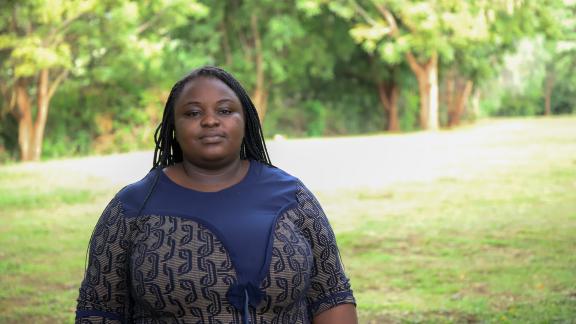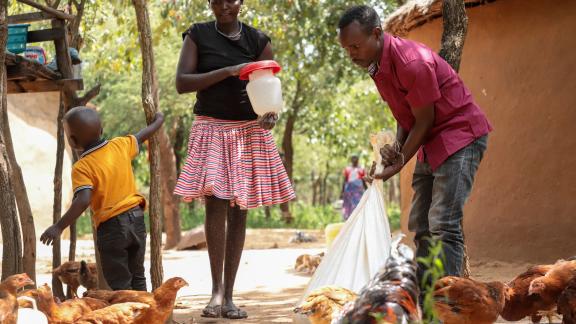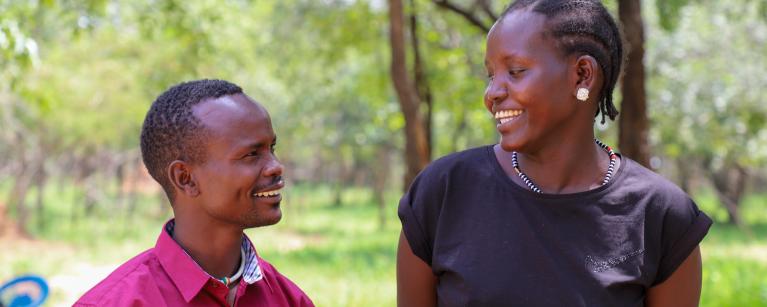After enduring years of marital conflict, Musa Lochoringole, aged 31, and his wife, Vivian Chemkea, aged 25, from Arol village in Karita sub-county, are now enjoying a peaceful marriage, thanks to the benefits of the Gender Action Learning System (GALS) methodology.
GALS is a participatory, visual methodology that empowers women and men, especially the marginalized, to plan, act, and collaborate for gender equality and better livelihoods.
Using simple diagrams for visioning, problem-solving, and peer learning, even low-literacy communities are enabled to drive social and economic change.
“Before becoming a model couple, there was no understanding, and we were constantly fighting,” says Musa, who was recruited to become a model couple through the structures of the Resilience Inclusiveness Sustainability and Empowerment of communities in Karamoja (RISE-K) project.
“Culturally, women are undermined, and our voices are not heard,” says Chemkea, who recalls that her husband made all the decisions in the home and expected her to just follow along.
The couple were among over 30 couples trained in GALS components by Oxfam partner the National Association of Women's Organizations in Uganda (NAWOU).
“We trained them on tools like the Gender Balance Tree (GBT) and Vision Road Journey (VRJ), and we also shared the five love languages and encouraged couples to work and plan together at household level.”

Comfort Ruth Ekigula is a project officer at NAWOU who has trained model couples on the GALS methodology under the RISE-K project
According to Lochoringole, one of the tools that enabled them to break away from the cycle of conflict within their marriage was the Challenge Action Tree (CAT).
The CAT is a participatory diagramming tool within the GALS methodology, which empowers individuals and communities to identify their personal challenges, understand their underlying causes, and commit to concrete, measurable actions to overcome them.
Through GALS training, the couple identified the root cause of their conflict as a lack of cooperation and Vivian’s exclusion from decision making in the home.
“We learned the benefits of planning together and also identified the things we do that benefit us as individuals and those that help us as a couple,” says Chemkea.
The couple were also taught to share responsibilities and chores in the house, which reduced the burden that had been on Chemkea, who previously did all the work in the home.
“I realised that she was doing all the work in the house, which was exhausting for her and causing her to lose weight, so I started sharing in some of the work. Whenever she’s sweeping, I now go and fetch water or feed the chicken.”
News of Lochoringole’s transformation quickly spread within the community and came with a lot of scrutiny.
“They started saying that I’d been bewitched, and whenever I would attend certain meetings, I wasn’t allowed to talk because now I had become a woman. The criticism of Musa however, quickly turned into admiration as they realized that his life was improving.”
The knowledge from the GALS methodology has also helped Lochoringole and Chemkea make more informed decisions at home, especially about their finances.
“When the project came in 2023, there was a small facilitation given to enable us to attend the training, and with the knowledge of planning together we’d got, we started putting aside some of the money and bought our first batch of twenty chickens at UGX 10,000 per chick.” Say Lochoringole.
The couple reared the chickens for three to four months, then sold them at a profit, with each mature chicken going for UGX 28,000.
“We realized it’s a good business and started buying more chickens, and expanded the business. From 2023 to date, we’ve sold over four hundred chickens, and it has helped improve our livelihood”

With the profits from the poultry business, the couple started diversifying their means of income into value chains like goat rearing.
“We bought twenty goats from the money got from the poultry business and today, we now own at least twenty-eight goats,” says Lochoringole.
Today, the couple’s compound is filled with poultry and goats, a sign of how their teamwork and planning have paid off. Their transformation has inspired others in their community, who now turn to them for guidance on strengthening their own marriages.
“On Sundays after church, we meet other couples and share our experiences with them. Our message is always on the importance of equality within the home and sharing responsibilities.”
Their harmony as a couple has even extended to Lochoringole’s mother, who lives nearby.
“They’ve transferred their love to me and always invite me to their home to share meals, and I am well taken care of,” she shares.
Musa and Vivian’s story shows how the GALS methodology can help couples move from conflict to cooperation both in their homes and in their shared livelihoods
Oxfam and partners use the GALS in the RISE-K project across Karamoja to promote inclusive development and empower both women and men.
By Ivan Aboga Rackara - Communications Assistant (Oxfam in Uganda)
